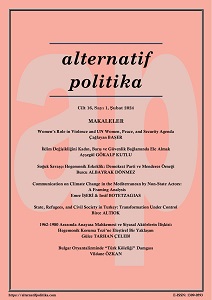BULGAR ORYANTALİZMİNDE “TÜRK KÖLELİĞİ” DAMGASI
“TURKISH SLAVERY” STIGMA IN BULGARIAN ORIENTALISM
Author(s): Vildane ÖzkanSubject(s): Modern Age, Cultural Anthropology / Ethnology, 13th to 14th Centuries, 15th Century, The Ottoman Empire
Published by: Rasim Özgür DÖNMEZ
Keywords: Bulgarians; Bulgarian Culture; Bulgarian Orientalism; Bulgarian “Turkish Slavery” Stigma; Ottoman State Rule on Bulgarians;
Summary/Abstract: In the dominant Bulgarian culture, the past tense plays a much more active role than the present and future tenses. The period of domination established by the Ottoman State over the Bulgarians between 1393 and 1878, after conquering the Second Bulgarian Empire, is stigmatized as the period of “Turkish slavery” in the dominant Bulgarian culture. This stigma was built in the 19th century and continues to this day. The stigma of “Turkish slavery” on the past in Bulgarian culture, today, encompasses many institutional and daily areas such as politics, diplomacy, formal and informal education, law, religion, ceremonies and holidays, folklore, film, art, literature, history, traditional media and social media, protest squares etc. However, this stigma is based on an unclear historical narrative and is shaped within an orientalist framework. On the other hand, there are also partial criticisms made by Bulgarians about the stigma in question today. The article consists of a sociological analysis of how and in which social-cultural conditions the “Turkish slavery” stigma of the period of Ottoman rule over Bulgarians was constructed, and how and in which areas it is reproduced today. The subject was researched largely on data obtained from original Bulgarian sources. In the theoretical dimension of the analysis, Said’s orientalism, Goffman’s stigma, Bourdieu’s field, Foucault’s problematization and Parsons’ function concepts are used. The number of studies on Bulgarian culture in Turkish sociological literature is almost non-existent. For this reason, the article also aims to contribute to Turkish sociological literature.
Journal: Alternatif Politika
- Issue Year: 16/2024
- Issue No: 1
- Page Range: 180-204
- Page Count: 25
- Language: Turkish

